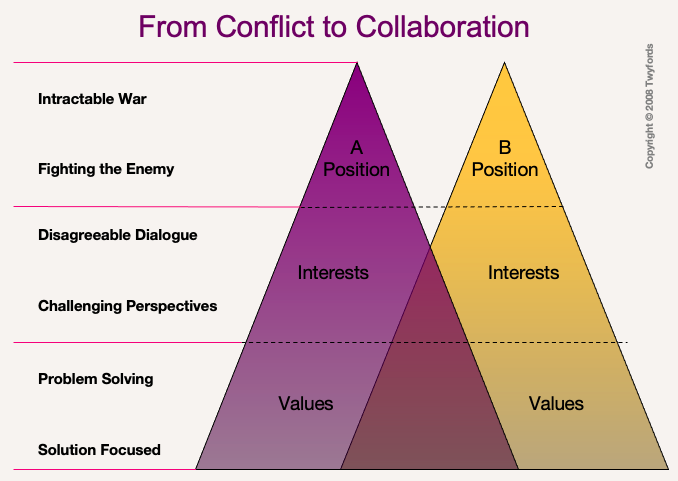Getting agreement among people who have diverse and strongly-held opinions is challenging, there is no doubt. But sometimes we make it more challenging than it needs to be by focussing on opinions, rather than seeking to understand why we hold them.
Here is a simple model to illustrate. We call it the values triangle.

The two triangles represent two people, each with a very different and strongly held opinion about an issue they must work on together. Let’s call that opinion their Position, as in “this is the position I’m taking on this issue”.
We can see that there is a lot of space between the two positions at the top; a gulf between how person A and person B see this situation. In this case the discussion often becomes a battle of wills, an argument between opposing sides, a ‘war’ where each side seeks to win while ensuring the other loses.
But let’s go deeper. We can see that the position each person holds is supported by their Interests, the things that they want. Person A holds position A because he feels it will deliver on his interests. Person B does the same with her position and interests. But too often neither person learns the interest of the other as they are too busy defending their own position and attacking the other.
And then let’s go deeper again. We can see that our interests are consistent with the fundamental Values we hold, our deep sense of the way the world is and should be. Often we struggle to articulate these values to ourselves, let alone share them with those we disagree with. Yet we can see that our values are often much more similar than we might imagine. We have much more in common than we expect.
And yet, because we are stuck trying to win the argument about our positions we can be deaf and blind to the values of the other. No wonder agreement can be so difficult!
Collaboration requires us to recognise that a person’s strongly-expressed opinion is not the sum total of who they are. They hold that position because it seems to them at least to support their interests, which will be consistent with their deep values. And their deep values are likely to be not too different to mine. If we can find ways to have conversations about the things that really matter to us about the current problem, we are much more likely to find common ground, to stop arguing and start listening. Best of all, we are much more likely to emerge from the discussion with a brand new idea that better matches the situation, and which we all own.
So the next time you have to wrangle people where there is a lot of disagreement about the way forward, you may want to encourage everyone to do less talking about their idea and more exploring of others’ positions, interests and values. If you would like to know more about how to do that talk to us about our collaborative processes, which incorporate a number of tools for shifting from argument to agreement.
